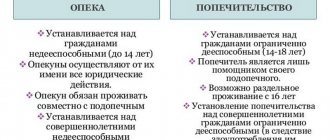Insured person - what is it?
The insured person is the party whose protection of interests is the subject of the concluded insurance contract. This is the general meaning of the term. But there are some subtleties when defining this subject when we are talking about different systems and areas of insurance.
The role of the insured person can be a citizen or organization that protects the integrity of life, health, property, and other interests in respect of which an insurance agreement has been concluded.
Responsibilities of persons insured in the compulsory health insurance system
In addition to rights, persons insured in the compulsory health insurance system also have certain responsibilities:
- The main one is the timely provision of reliable information and original documents directly to the insurer or policyholder.
- If changes occur in the documents (change of first or last name due to marriage), the citizen should notify the Pension Fund or the employer about this. Any change in personal information may affect the payment of pension benefits when they are established.
- In addition, the insured person must comply with all conditions established for the formation and payment of a pension.
Can the policyholder be a beneficiary?
The policyholder is the entity that acts as the party concluding the insurance contract and paying the insurance premiums. But the policyholder is not always the recipient of insurance payments.
If a person has insured his own life and health in a personal insurance contract, he is usually the beneficiary.
The contract between the insurer and the policyholder is drawn up in such a way that, in addition to these entities, a beneficiary must be indicated. A direct indication of the person receiving insurance payments eliminates all possible questions when making payments, in accordance with the stipulated terms of the agreement.
Can the policyholder and the insured person not be the same?
The coincidence of the policyholder and the insured person is not always noted. For example, if an insured event occurs under a life insurance contract, the beneficiary may be another person, since the policyholder is physically unable to receive payment. In this case, the insured person is the policyholder and by his decision appoints the beneficiary fixed in the agreement.
Another clear example is a mother insuring her child under the VHI system. In this case, the woman acts as the policyholder, and the baby is the insured person. Although the beneficiary and the insured in this case are the same, since the mother will receive a payment to pay for the medical expenses of the child if the latter has not reached the age of majority.
Related article: The concept of combined insurance
In case of a collective insurance agreement, if in order to obtain a loan from a bank, the client joins such an agreement.
In this case, three parties agree:
- bank as insurer;
- the insurance company is the insurer;
- a client who applies to a bank for a loan is an insured person.
The beneficiary in this agreement is the bank, since it is to this financial organization that the insurer will pay the insurance if the client does not pay off the loan obligations.
Rights and obligations
To understand in more detail the differences between insurance entities, it is necessary to consider the rights and obligations of each party. Knowledge of these distinctive features will allow you to correctly distinguish between subjects, which can be useful when concluding an appropriate agreement and will save the insurer’s employees from unnecessary questions from clients.
Insured
An insured is one of the insurance participants who, in return for contributions or premiums paid to the insurer, gets the opportunity to demand payment of material compensation for the beneficiary.
Policyholders are obliged to:
- timely transfer contributions under the insurance contract, at the established frequency and in the prescribed amount;
- notify the insurance company about circumstances contributing to an increase in insurance risks or the scale of possible losses in the event of an insured event;
- follow the recommendations of the insurance company aimed at reducing risks and minimizing possible damage from an adverse event provided for by the insurance policy;
- inform the insurer about the insured event that has occurred, in compliance with the stipulated deadlines, notification forms and other conditions stipulated by the agreement.
The rights of the policyholder include the following:
- the opportunity to have complete information regarding the availability of a license and other permits from the insurance company, and other information about the nature of the activity of this organization;
- receive payments under the insurance policy if the subject combines the role of beneficiary, subject to the provision of the necessary documentation to document the circumstances of the insured event;
- initiate early termination of the agreement, if necessary, with the return of the paid insurance premium;
- choose another insurance company;
- replace the insured person by sending a corresponding application to the insurer.
The policyholder has the right to apply to a judicial authority with a claim against the insurance company if disputes arise that cannot be resolved through negotiations or through pre-trial proceedings.
Insured person
The rights and obligations of the insured are largely determined by the specific insurance system.
Related article: Who are the policyholder and the insurer in the insurance business?
Within the framework of health insurance, these entities have the right to:
- receive free medical care within the limits determined by the terms of the policy;
- independently choose a medical institution to provide assistance;
- choose an insurance company with the possibility of replacing it during the year according to the calendar;
- choose a specialist to contact;
- receive from the insurer, territorial fund and other authorities reliable information about the nature and conditions of the provision of medical care;
- require confidentiality of personal data.
The responsibilities of insured persons in the compulsory medical insurance and voluntary medical insurance system are:
- present the policy as confirmation of the right to receive free services when seeking help from a healthcare institution;
- submit an application to the insurer to conclude the relevant contract;
- notify the insurance company about changes in personal information;
- choose a new insurer if you move to a new place of residence.
Within the pension insurance system, the insured person has the following rights:
- require from the Pension Fund of the Russian Federation at the address of residence, information regarding personal account data;
- receive from the policyholder information sent to the Pension Fund regarding one’s own personal data;
- demand correction of incorrect information in the personal account.
The responsibilities of the insured person in the OPS system include:
- registration with the Pension Fund;
- obtaining a pension certificate and presenting it to Pension Fund employees upon their request;
- notification of the Pension Fund about changes in personal data with the inclusion of replaced information in the corresponding electronic register, the fact of loss of the insurance certificate;
- providing the insurance company with data confirming personal account information.
Regardless of the insurance system, the insured person must be familiar with the terms of the agreement concluded in relation to him, and have the right to defend his interests in court.
Beneficiary
The main rights of the beneficiary include:
- the ability to demand from the insurance company payments provided for by the terms of the policy;
- refuse to receive insurance amounts;
- hope to maintain the confidentiality of personal information;
- be familiar with the terms of the contract being concluded.
Responsibilities of beneficiaries include:
- taking actions that reduce the likelihood of adverse events occurring, increasing insurance risks;
- notification of the insurer about possible risks that could negatively affect the safety of the insured property and other insurance items;
- immediate notification of the insurance company about the occurrence of an event covered by insurance.
Depending on the circumstances, the nature of the agreement and the insurance system, the rights and obligations of each of the listed entities may vary. In this case, it is possible to combine the roles of these parties.
The concept and subjects of compulsory pension insurance in the Russian Federation
To form pension rights, working citizens must register with the compulsory pension insurance system. This system assumes that employers must contribute funds, acting as insurance premiums, for their own employees. In addition, self-employed and unemployed citizens can make such contributions on their own.
Among the subjects of legal relations in the legal security system, the following are distinguished:
- Insurer. It can be the Pension Fund or another non-state pension fund (NPF).
- Insured. Policyholders include all legal entities, employers, and individuals who independently make pension contributions.
- Insured person. This is any citizen who has SNILS.
That is, the mandatory insurance system created by the state is a set of measures that are aimed at forming and protecting the pension rights of all citizens who received an insurance policy in it. This system is based on insurance principles, according to which insurers are required to make contributions for persons with insurance.
Who is the insured person in the Pension Fund
The list of insured persons in the compulsory pension insurance system is determined by the provisions of Art. 7 of Federal Law No. 167, adopted in December 2001 and regulating pension insurance issues in the Russian Federation.
Related article: Checking whether a person is insured
More information about the features of compulsory pension insurance can be found here.
The opportunity to become an insured and beneficiary of the OPS applies to the following persons who are Russian citizens living in Russia or abroad, as well as foreigners employed in the territory of the Russian state:
- have officially entered into an employment agreement with the employer;
- businessmen and other persons who provide themselves with work independently;
- those employed abroad, but paying contributions to the Pension Fund;
- engaged in the traditional craft of individual peoples of the North, Siberia and other regions;
- clergy.
The main condition for belonging to the compulsory insurance system is the payment of insurance contributions to the Pension Fund.
Who can act as an insured
In Art. Art. 5 Federal Law No. 4015-1 dated November 27, 1992 “On the organization of insurance business in the Russian Federation” states that not only an individual, but also an organization can act as a client of a company.
Individuals
According to the law of November 27, 1992 No. 4015-1, the policyholder can be any legally capable person. According to Art. 60 of the Constitution of the Russian Federation, full legal capacity of Russians occurs at the age of 18 years. During the period from 14 to 18 years of age, citizens are considered partially capable: parents or legal representatives (guardians) bear full responsibility for them.
People with limited legal capacity cannot initiate contracts with the insurance company. But their representatives have the right to arrange the service on their own behalf, indicating them as insured persons.
Basic requirements of insurers:
- The client has an identification document. Preferably a Russian passport, but not only. Foreign citizens can also insure themselves, loved ones and real estate in Russia. They must present a document by which they can be identified.
- Age from 18 years. In other cases - with the consent of the representative or parent.
- Additional documents, depending on the insurance industry. Driver's license, technical passport and diagnostic card - according to OSAGO. Loan agreement, appraiser's conclusion, certificates from the developer - when drawing up a collateral policy.
Replacement of the policyholder in the insurance contract
The need to replace the policyholder or beneficiary, in accordance with the concluded agreement, may be due to the following circumstances:
- his death, as a result of which the rights of this person pass to the heir or to the one specified in the agreement;
- loss of legal capacity or its limitation - in this case, the functions of the policyholder are transferred to his guardian or trustee.
Replacement of the insured person and beneficiary is possible until the insured event occurs, and is issued on the basis of a written notification to the insurer sent by the policyholder. The insured person or beneficiary can be replaced by the policyholder, with amendments to the insurance contract concluded by the parties by an additional agreement.
The insured person in most cases is the beneficiary under the terms of the policy. But it is necessary to take into account that this situation is not always observed and the beneficiary may be different, which is important to understand when concluding an insurance contract.
General characteristics of system participants
The basic rules of the insurance system are set out in Federal Law No. 167-FZ, and the participants in this program include:
- Insurers - Pension Fund of the Russian Federation and non-state pension funds.
- Policyholders are legal entities, entrepreneurs and citizens who pay insurance premiums for themselves and their employees.
- Insured persons for whose benefit the insurance is carried out.
It is the insured person in the Pension Fund of the Russian Federation or one of the NPFs who has the right to count on receiving payments in the event of the occurrence of cases directly specified in the law.
Note! According to the rules of Federal Law No. 167-FZ, only individuals can be insured persons, since only they have the right to count on the establishment of payments upon the occurrence of an insured event.
Enterprises and organizations participate in the system only as insurers. Insured persons under compulsory pension insurance are not only citizens of the Russian Federation, but foreign residents or stateless persons whose duration of work in the country exceeded six months. Any subject who has entered into an employment relationship with an employer in the territory of the Russian Federation is subject to insurance of this type.










